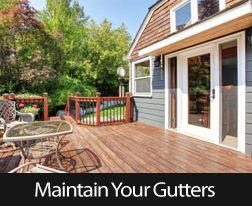 An entire gutter system around the home might seem expensive to many homeowners.
An entire gutter system around the home might seem expensive to many homeowners.
However, not having one could mean water pooling around your home creating a moat and costing you thousands of dollars in damage to your foundation.
So it’s a good idea to install gutters and take care of them.
Below are tips for gutter maintenance to help keep water away from your home.
Unclog The Gutters
Annual gutter maintenance includes cleaning them of debris, such as leaves, sticks or animal nests. Remove downspout cages and clean them.
Determine if they’re still in good shape or need to be replaced.
If a downspout is clogged, try to use a plumbing snake to dislodge the debris. Then use a hose to force water down the spout and hopefully remove the rest of the clog.
Check The Pitch
Gutters should be set on an incline of 1/4 inch for every 10 feet. For example, if your gutter is 20 feet long, then it should have a drop of 1/2 inch. If your gutter doesn’t have enough of an incline, then you might have water overflow because it can’t drain quick enough.
Most gutters also come to a point in the middle so the water runs both ways to downspouts on each end.
Seal Leaky Gutters
Right after a rainstorm, inspect your gutters for leaks. Look for water-saturated areas along your home underneath the gutter.
Constant leaks can cause water damage to vinyl, brick or stone siding. Use a sealant to repair small leaks or purchase a gutter maintenance patch kit for larger holes.
Replace Damaged Areas
If part of your gutter falls off or is damaged beyond repair, then you’ll need to replace it. You’ll need two ladders, a helper, new gutter cut to fit, joint connectors and sealant.
Remove old joint connectors and clean the area. Fit the new joint connectors with sealant and then install the new piece of gutter.
Install A New Downspout
You’ll need roughly the same tools for replacing the gutter, except you’ll also require downspout sections and self-tapping gutter screws.
Make sure the drop outlet at the end of the gutter fits securely into the downspout to prevent leaking.
Then fasten the joint with gutter screws and add sections as needed.
Finish with an elbowed section that extends five feet into the yard.
Leave a Reply